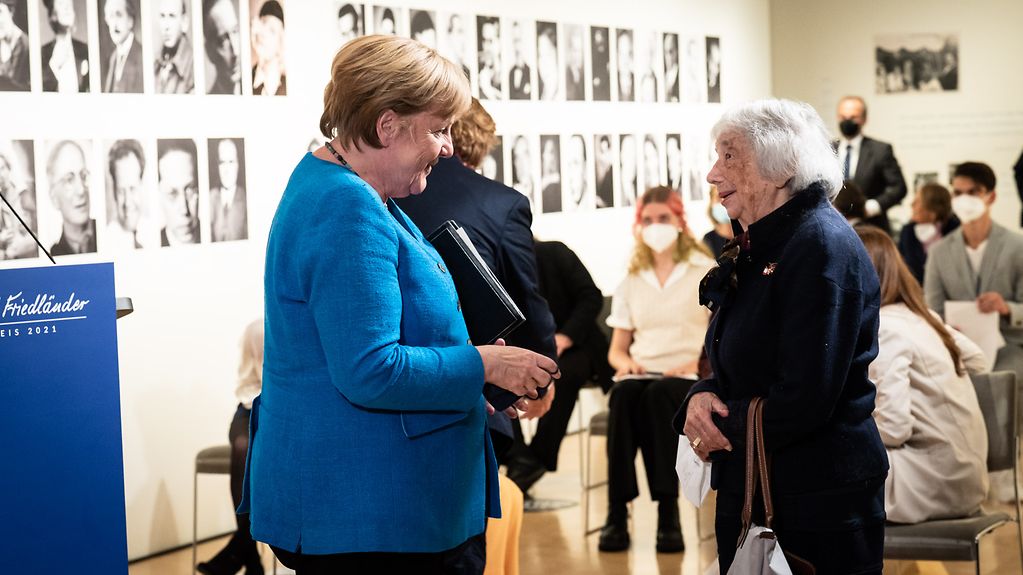Margot Friedländer Award
Three youth projects have received the Margot Friedländer Award for their examination of the Holocaust. Federal Chancellor Merkel congratulated the young award winners personally, emphasising that they were “impressive examples” of how to oppose anti-Semitism and hatred.
3 min reading time

Federal Chancellor Merkel with Margot Friedländer: the 99-year-old Holocaust survivor is committed to understanding and tolerance.
Photo: Federal Government/Steins
To take part in the Margot Friedländer Award, pupils explored “the lives and fates of people who had hopes and dreams like anyone else but who were not only deprived of these hopes and dreams but were also stripped of their dignity and finally systematically murdered” – as Federal Chancellor Angela Merkel stressed at the award ceremony on Monday.
The Federal Chancellor said she was very pleased to see the enormous interest the award was attracting all over Germany. It was of crucial importance for cohesion and for the future of our society to keep the memory of the Shoa alive and to carry this memory forward, said Merkel. The Margot Friedländer Award was primarily aimed at strengthening the commitment of young people in the long term.
The Margot Friedländer Award of the Schwarzkopf Foundation Young Europe was introduced in 2014. It is presented to young people who investigate the Holocaust and speak out against today’s forms of anti-Semitism, racism and exclusion. This year, some 50 applications were submitted from all federal states and all types of school. The award is named after contemporary witness and Holocaust survivor Margot Friedländer.
The 2021 award winners
The Schwarzkopf Foundation advises and supports young people in pursuing concrete projects relating to the Holocaust, and honours their commitment with the Margot Friedländer Award. The winners not only receive prize money to pursue their project, they also participate in an educational programme. The three winning projects in 2021 are as follows:
- “Diary of Feelings - Searching for Traces” / SBH-Südost GmbH/Halle
Schoolchildren at different types of school in Halle have been working on the “Diary of Feelings” in their free time for eight years. They follow the suffering of Europe’s Jewish population and record their own thoughts and feelings; the results are then used for teaching at Halle’s schools. They organise readings in different subjects. - “Unforgotten Podcast” / Johann-Conrad-Schlaun Berufskolleg Warburg
Young people developed a podcast with 15 to 25 episodes on the topics of remembering, experiences of exclusion, discrimination, migration and dealing with minorities. The makers of the podcast opted for a regional perspective here in order to be able to create a stronger sense of identification. The individual episodes feature thematic aspects and interviews with experts as well as presenting the personal biographies of persecuted individuals. - “Traces in the Cityscape - Persecution and Expropriation of Jewish Leipzigers” / Gymnasium der Stadt Leipzig
In Leipzig’s city centre there are historic commercial buildings that were confiscated from their Jewish owners by the National Socialists. By conducting research in various archives, the project group is investigating the history of these buildings and their former owners as well as their use by the beneficiaries of the expropriation.
Federal Chancellor Merkel said she was highly impressed at the wealth of ideas and creativity that went into the projects every year. She thanked all those involved “for their great commitment”. Merkel also expressed her special thanks to contemporary witness and Holocaust survivor Margot Friedländer, whom the award is named after. For years, the 99-year-old has found the strength to tell schoolchildren the story of her life and suffering.
Friedländer herself called on the young people to continue their efforts because soon there would be no more living witnesses.
The non-partisan Schwarzkopf Foundation Young Europe was founded in 1971. It seeks to support young people in becoming politically aware and responsible individuals. The aim is to strengthen the European idea as well as boost efforts to combat right-wing extremism, anti-Semitism and racism. The Federal Ministry for Family Affairs supports the Foundation through the federal programme “Live Democracy!”